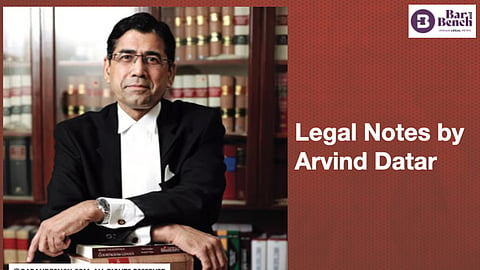
- Latest Legal News
- News
- Dealstreet
- Viewpoint
- Columns
- Interviews
- Law School
- Legal Jobs
- हिंदी
- ಕನ್ನಡ

Prof. Peter Leyland, in his textbook on Administrative Law, 8th Edition, p.368, points out that the phrase “legitimate expectation” has its origin in a judgment rendered by Lord Denning in Schmidt v. Secretary of State for Home Affairs [1969] 2 Ch 149. A few American students had been granted residence permits to stay at a “recognized educational establishment”. They joined a college of scientology. During their course of study, the Home Secretary withdrew the recognition to this college and the American students’ application for renewal of their permit was refused. The students pleaded that they had been denied an opportunity of being heard. But this prayer was rejected because their residence permits had already expired. However, Lord Denning pointed out that if the permission had been revoked before the expiry of the time period, they would have the right to be heard because “they had a legitimate expectation of being allowed to stay for the permitted time”. This, as Dr. Christopher Forsyth has pointed out, was the grant of procedural protection of a substantive expectation of being allowed to stay in the UK.
The importance of natural justice and fairness gained importance throughout the Commonwealth after the historic judgment in Ridge v. Baldwin [1964] AC 40. But the case that cemented the importance of legitimate expectation in administrative law was Council of Civil Service Unions v Minister for the Civil Service [1985] AC 374. Concerned about the increasing number of strikes, the UK Government limited certain union rights of employees. It was pleaded that these changes had taken place without consulting them. The changes were upheld on grounds of national security but the court went on to emphasize the importance of procedural fairness. The House of Lords pointed out that legitimate or reasonable expectation may arise from an express promise given on behalf of a public authority or from the acceptance of a regular practice which the claimant can reasonably expect to continue (at page 401). This case is now accepted as creating procedural legitimate expectation.
However, the substantive dimension of legitimate expectation also began to develop as it was felt that there was no reason to limit the doctrine only to procedural requirements. The first important case that laid down the substantive aspects was R v. Ministry of Agriculture, Fisheries and Food, ex p Hamble (Offshore) Fisheries Ltd. [1995] 2 All ER 714. At the relevant time, licenses for fishing vessels could be transferred but a sudden change in policy prohibiting such transfers was challenged as violating the principle of legitimate expectation. Although on merits, the application was dismissed, Justice Sedley held that the real question was one of fairness in public administration. If there is a legitimate expectation that something will or will not be done, it would be unfair to frustrate this expectation. The learned judge pointed out that while the Government can change its policy, it is equally important that the interest of individuals, who are affected by the change, are protected unless there is overriding public interest. It was observed that while no individual can expect a policy to stand still it is for the courts to consider the fairness of the decision.
This decision was initially criticized but it was finally approved in 2001 in the leading case of R v. North and East Devon Health Authority, ex p Coughlan (2000) 2 WLR 622 (CA). Lord Woolf pointed out that if a promise or a practice had induced a legitimate expectation of a benefit which was substantive and not merely procedural, the courts can, in proper cases, decide whether frustration of such expectation is so unfair that it amounted to an abuse of power. Once the legitimacy of the expectation is established, the court will have the task of weighing the requirements of fairness in overriding public interest involved in the change of policy.
This principle also, in a certain sense, involved the application of the principle of proportionality. Thus, in the UK, the courts have to first decide whether the expectation was indeed legitimate in the continuing of a particular policy. The next question is: does the change in policy result in unfairness to such a degree that it amounts to abuse of power. The answer to this question will necessarily involve the question of proportionality.
In India, the procedural and the substantive legitimate expectation have now become part of our administrative law. By making legitimate expectation a facet of Article 14, it is now part of our constitutional law as well. The relation between legitimate expectation and Article 14 will be discussed in the next article.
Arvind P Datar is a Senior Advocate practicing before the Supreme Court of India.